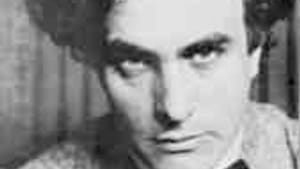Stay in the Loop
BSR publishes on a weekly schedule, with an email newsletter every Wednesday and Thursday morning. There’s no paywall, and subscribing is always free.
I suspect you haven't heard very many live performances of music by Edgard Varèse. Nobody has, although Leopold Stokowski championed Varèse in Philadelphia about 80 years ago.
His compositional vision— which included purely electronic music, large-scale works for percussion alone, and the incorporation of noise into music— was decades ahead of his time. Nevertheless, Varèse (1883-1965) has come to be regarded as an oddball maverick rather than a member of the 20th Century pantheon; he doesn't enjoy the cachet of Stravinsky and Schoenberg, or even of Stockhausen and Boulez. And his total output comprises only 15 or so extant works, all of them less than 30 minutes long.
So, I have a suggestion. Let's have a Varèse festival. It would only take two evenings. We could enlist Orchestra 2001 at the Perelman for the first night to do the smaller works, like Integrales and Density 21.5, and have Yannick Nézet-Séguin lead the Philadelphia Orchestra the next night across the lobby at Verizon Hall.
Of course, this short festival would require solving a few practical details: rounding up every free-lance percussion and brass player in the Delaware Valley; finding virtuoso soprano and bass soloists; enlisting a chorus with the abilities of the Philadelphia Singers; and finding a way to do the electronic music in Poème Électronique and Deserts.
But I guarantee it would be worth it. I can see it now: sold-out houses both nights, even if the concerts are on weeknights; people holding up placards saying, "Need tickets!" in the lobby and on the street outside; wildly ecstatic crowds.
Never in Philadelphia
Sounds silly, doesn't it? Even if the funding and personnel problems of such an enterprise were solved, it's hard to imagine Philadelphians flocking to hear Varèse as if he were the second coming of Stravinsky. But as a matter of fact, if you switch the venue to Lincoln Center in New York, my fantasy description above is an accurate unexaggerated account of the Varèse festival that I just attended.
When one of my oldest friends invited me to attend these concerts, both of us went expecting a sparsely attended musical curiosity, a rare opportunity to hear some esoteric music. I cannot yet quite get my mind around the significance of what actually happened.
All I can say is that those New Yorkers were on to something. Varèse's music is shocking and exhilarating. It has no melodies, virtually no tonal implications; it's all wild, intense blocks of sound filling up musical and physical space. Rather than palling, it benefits from being heard all at once.
(Riccardo Chailly recorded a 2-CD set of Varèse's complete works on Decca in 1998. If you go to iTunes and listen to 30-second samples of every piece, you'll get a good idea of Varèse's musical universe.)
Eating my words
Two and a half years ago, Varèse's Ameriques"“ a work that received its premiere under Stokowski"“ was performed as a novelty piece on a Philadelphia Orchestra concert that featured pianist Hélène Grimaud playing Beethoven's "Emperor" Concerto. I am embarrassed to reread what I wrote about the piece in what I otherwise regard as one of my best reviews on this site: "I found the Varèse … to be entertaining but quaint, like Dadaism with its mink-lined teacups." (BSR, December 11, 2007.)
What was I thinking? On Tuesday, Ameriques— a gigantic maelstrom of sound with, to be sure, echoes of Le Sacre— was the final work of the Varèse Festival. It practically tore the roof off Avery Fisher Hall. The audience, which had been cheering even the re-arrangement of chairs between pieces"“ no, really, they were!"“ carried on until the New York Philharmonic's music director Alan Gilbert finally held up the score, pointed to Varèse's name and waved goodbye.
Those sullen strings
There was, however, one puzzling and unsettling aspect to Tuesday's concert. One group of people in Avery Fisher Hall didn't seem happy to be there: the strings of the New York Philharmonic.
Despite the fact that they had just brought off a brilliant performance of a formidably difficult work, and despite the fact that they were receiving a standing ovation, when Ameriques ended, they looked like surly pre-teens who'd been dragged to some unbearable adult event. They stood there stone-faced, not the hint of a smile on anyone's face. It was only after the fifth curtain call or so that a few of them— somewhat sheepishly, it seemed to me— began to melt.
Had something terrible just happened? Had they been forcefully dragged from their beds to rehearse at 3 a.m.? I guess I'll never know.
I can think of only one other classical concert experience that elicited this sort of audience frenzy: the night about 50 years ago when, just after Carnegie Hall had been saved from the wrecking ball, Leonard Bernstein conducted Beethoven's Ninth there. It remains one of my life's musical landmarks. I like to think that decades from now, some who were there might similarly recall this Varèse festival.♦
To read a reply, click here.
His compositional vision— which included purely electronic music, large-scale works for percussion alone, and the incorporation of noise into music— was decades ahead of his time. Nevertheless, Varèse (1883-1965) has come to be regarded as an oddball maverick rather than a member of the 20th Century pantheon; he doesn't enjoy the cachet of Stravinsky and Schoenberg, or even of Stockhausen and Boulez. And his total output comprises only 15 or so extant works, all of them less than 30 minutes long.
So, I have a suggestion. Let's have a Varèse festival. It would only take two evenings. We could enlist Orchestra 2001 at the Perelman for the first night to do the smaller works, like Integrales and Density 21.5, and have Yannick Nézet-Séguin lead the Philadelphia Orchestra the next night across the lobby at Verizon Hall.
Of course, this short festival would require solving a few practical details: rounding up every free-lance percussion and brass player in the Delaware Valley; finding virtuoso soprano and bass soloists; enlisting a chorus with the abilities of the Philadelphia Singers; and finding a way to do the electronic music in Poème Électronique and Deserts.
But I guarantee it would be worth it. I can see it now: sold-out houses both nights, even if the concerts are on weeknights; people holding up placards saying, "Need tickets!" in the lobby and on the street outside; wildly ecstatic crowds.
Never in Philadelphia
Sounds silly, doesn't it? Even if the funding and personnel problems of such an enterprise were solved, it's hard to imagine Philadelphians flocking to hear Varèse as if he were the second coming of Stravinsky. But as a matter of fact, if you switch the venue to Lincoln Center in New York, my fantasy description above is an accurate unexaggerated account of the Varèse festival that I just attended.
When one of my oldest friends invited me to attend these concerts, both of us went expecting a sparsely attended musical curiosity, a rare opportunity to hear some esoteric music. I cannot yet quite get my mind around the significance of what actually happened.
All I can say is that those New Yorkers were on to something. Varèse's music is shocking and exhilarating. It has no melodies, virtually no tonal implications; it's all wild, intense blocks of sound filling up musical and physical space. Rather than palling, it benefits from being heard all at once.
(Riccardo Chailly recorded a 2-CD set of Varèse's complete works on Decca in 1998. If you go to iTunes and listen to 30-second samples of every piece, you'll get a good idea of Varèse's musical universe.)
Eating my words
Two and a half years ago, Varèse's Ameriques"“ a work that received its premiere under Stokowski"“ was performed as a novelty piece on a Philadelphia Orchestra concert that featured pianist Hélène Grimaud playing Beethoven's "Emperor" Concerto. I am embarrassed to reread what I wrote about the piece in what I otherwise regard as one of my best reviews on this site: "I found the Varèse … to be entertaining but quaint, like Dadaism with its mink-lined teacups." (BSR, December 11, 2007.)
What was I thinking? On Tuesday, Ameriques— a gigantic maelstrom of sound with, to be sure, echoes of Le Sacre— was the final work of the Varèse Festival. It practically tore the roof off Avery Fisher Hall. The audience, which had been cheering even the re-arrangement of chairs between pieces"“ no, really, they were!"“ carried on until the New York Philharmonic's music director Alan Gilbert finally held up the score, pointed to Varèse's name and waved goodbye.
Those sullen strings
There was, however, one puzzling and unsettling aspect to Tuesday's concert. One group of people in Avery Fisher Hall didn't seem happy to be there: the strings of the New York Philharmonic.
Despite the fact that they had just brought off a brilliant performance of a formidably difficult work, and despite the fact that they were receiving a standing ovation, when Ameriques ended, they looked like surly pre-teens who'd been dragged to some unbearable adult event. They stood there stone-faced, not the hint of a smile on anyone's face. It was only after the fifth curtain call or so that a few of them— somewhat sheepishly, it seemed to me— began to melt.
Had something terrible just happened? Had they been forcefully dragged from their beds to rehearse at 3 a.m.? I guess I'll never know.
I can think of only one other classical concert experience that elicited this sort of audience frenzy: the night about 50 years ago when, just after Carnegie Hall had been saved from the wrecking ball, Leonard Bernstein conducted Beethoven's Ninth there. It remains one of my life's musical landmarks. I like to think that decades from now, some who were there might similarly recall this Varèse festival.♦
To read a reply, click here.
What, When, Where
The Complete Works of Edgard Varèse. International Contemporary Ensemble and New York Philharmonic. July 19-20, 2010 at Alice Tully Hall and Avery Fisher Hall, Lincoln Center, Broadway and 65th St., New York. new.lincolncenter.org/live/index.php/lcf-2010-varese.
Sign up for our newsletter
All of the week's new articles, all in one place. Sign up for the free weekly BSR newsletters, and don't miss a conversation.

 Dan Coren
Dan Coren
